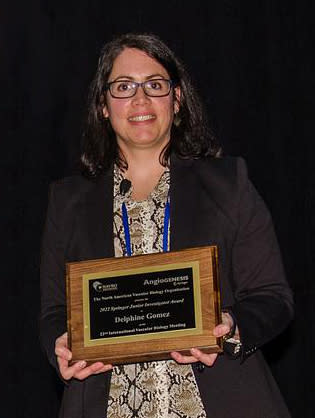Recorded Webinar: Delphine Gomez, Springer Award Recipient

Recorded Webinar: Delphine Gomez, Springer Award Recipient
2/3/2023 - 2/1/2024
Description
This webinar featured Dr. Delphine Gomez, Assistant Professor of Medicine at the University of Pittsburgh, presenting her Springer Junior Investigator Award Lecture entitled: H3K4me2 regulates microvascular SMC recruitment and coverage during hindlimb ischemia-induced angiogenesis. This lecture was featured at the 22nd International Vascular Biology Meeting.
Abstract: H3K4me2 regulates microvascular SMC recruitment and coverage during hindlimb ischemia-induced angiogenesis: Dynamic and reversible phenotypic modulation of smooth muscle cell (SMC) is essential for adaptive vascular remodeling. We recently identified a central epigenetic axis regulating SMC fate and phenotypic consisting in the histone modification H3K4me2 which mediates the selective recruitment of the DNA demethylase TET2 on SMC genes. We developed tools to perform selective H3K4me2 ablation on SMC contractile genes by fusing Myocardin with the H3K4 demethylase LSD1 (Myocd-LSD1). In vitro and in vivo epigenome editing studies using Myocd-LSD1 showed that H3K4me2 governs SMC lineage identity and contractility, while restraining its plasticity. H3K4me2 also regulates SMC ability to engage in remodeling after carotid artery ligation. Both H3K4me2 editing and TET2 knockdown led to reduced SMC migration. Yet, whether the H3K4me2/TET2 complex controls SMC participation in angiogenesis and microvascular remodeling has not been evaluated. We conducted neovascularization analysis after femoral artery ligation-excision using a newly generated SMC-specific MyocdLSD1 transgenic mouse. Impaired blood reperfusion was observed in Myocd-LSD1SMC+/- and TET2SMC-/- mice compared with respective controls. Fate mapping analysis revealed that this defect was due to a loss of SMCmediated perivascular coverage on neovessels. In vitro angiogenic assays showed that H3K4me2 editing in SMC impairs tube formation by endothelial cells (EC) and proper EC/SMC interactions. Mechanistically, the defective SMC response was associated with altered Notch signaling and a marked decrease in Hey2. Our data provide evidence of the central role of H3K4me2/TET2 in regulating SMC ability to interact with EC and remodel the microvasculature during hindlimb ischemia.
Images

This recording is available 24/7 from now through February 1, 2024.
NAVBO Online
Webinar Series
1
